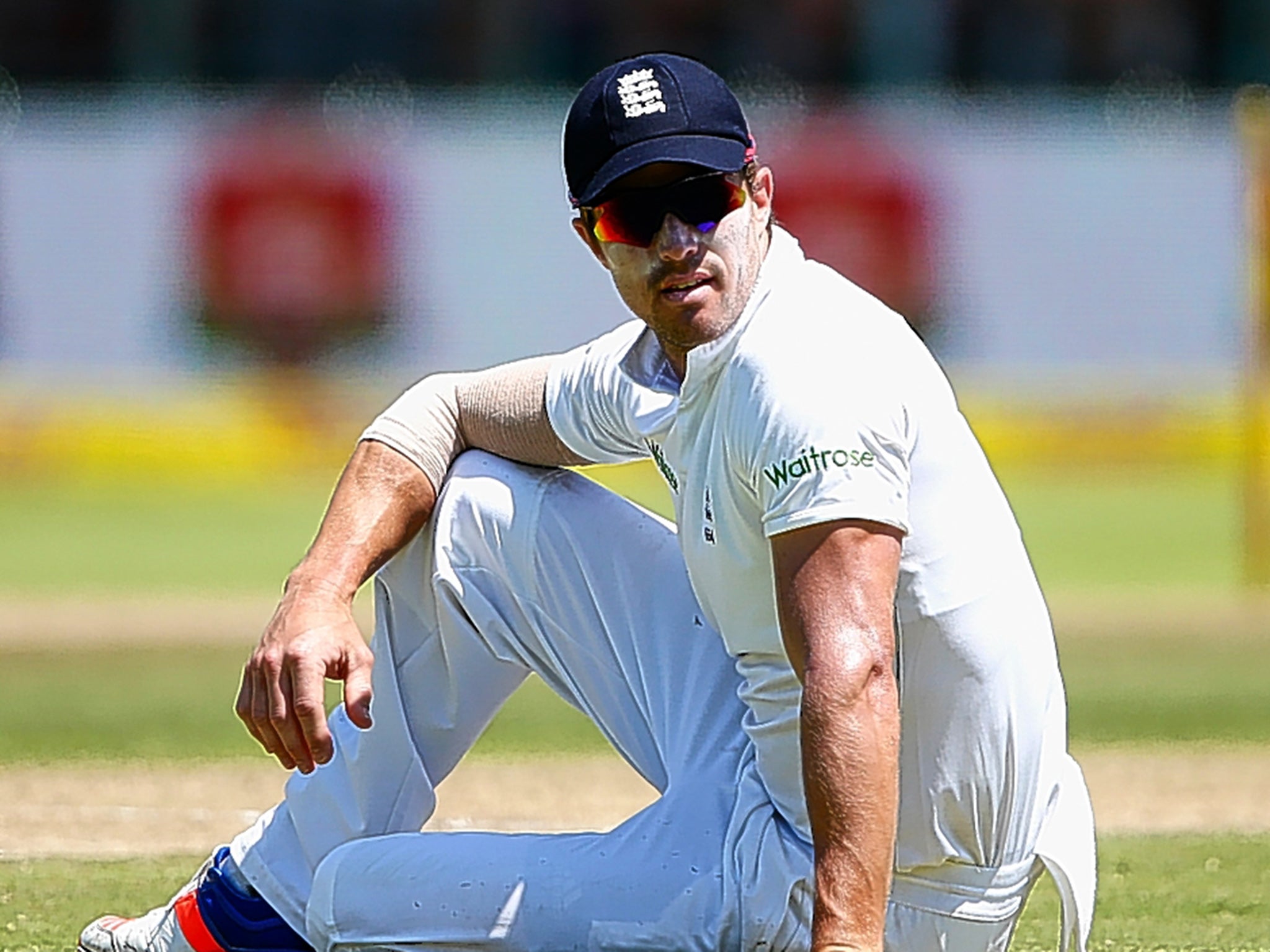South Africa vs England: Five questions from second Test's erratic draw
Bayliss praises Stokes but hopes dropped catches are a one-off

Your support helps us to tell the story
From reproductive rights to climate change to Big Tech, The Independent is on the ground when the story is developing. Whether it's investigating the financials of Elon Musk's pro-Trump PAC or producing our latest documentary, 'The A Word', which shines a light on the American women fighting for reproductive rights, we know how important it is to parse out the facts from the messaging.
At such a critical moment in US history, we need reporters on the ground. Your donation allows us to keep sending journalists to speak to both sides of the story.
The Independent is trusted by Americans across the entire political spectrum. And unlike many other quality news outlets, we choose not to lock Americans out of our reporting and analysis with paywalls. We believe quality journalism should be available to everyone, paid for by those who can afford it.
Your support makes all the difference.Did England miss an opportunity?
It was not simply that England scored 629 for 6 in their first innings, it was that they scored them in 125.5 overs. Even in this era, gathering Test runs at almost five an over is high-velocity stuff.
Of the 51 Tests in which the side batting first has made a total of 600 or more, 37 have been won and 36 now drawn. This level pegging is almost certainly because a flat pitch is a flat pitch, and the five Tests (out of 2,198) in which both sides have made in excess of 600 have all been drawn.
However, as England’s head coach, Trevor Bayliss, observed, that does not tell the full story of what happened at Newlands this year. England created a real opening with their rapidity and then threw it away through the alacrity with which they spurned chances. Bayliss recognised an opportunity missed.
“Certainly from my point of view,” he said. “You just never know, do you? And you can’t take things back. I’ve seen nine or 10 catches reported, I think it was four or five we should have taken.
“The others were half-chances. If one or two of them stick you do well. But I think if we’d have taken those – and you can’t really tell how the rest of the game would have panned out – I believe it could have been us bowling on this last day going for a Test win.”
Why did England have such a fit of the dropsies?
Under Bayliss’s tutelage, England’s close catching has improved markedly. That heady morning against Australia at Trent Bridge last August, capped by Ben Stokes’ screamer, when everything went to hand and everything stuck, was unique but England had started to be much less capricious than for years.
“We’ll certainly be working on it but no more, no less than what we’ve done in the past,” Bayliss said resignedly. “We do spend a lot of time on the catching especially. That’s why it’s disappointing when you put in the hard work and every now and again it doesn’t work. Hopefully, it’s something that’s a one-off.”
If something less than straightforward had stuck it might have had a galvanising effect on the others. Five chances should have been taken, another three were on any professional’s radar, another two might have stuck on a good day. It was far from a good day.
Will Hashim Amla’s resignation spread panic in South Africa’s ranks?
Bavuma faces the same ‘doubts’ that have plagued Amla
South Africa is a country which wears its heart on its sleeve. It is history, of course, that has provoked this and two events in the past few days have created outpourings of jubilation and angst.
Temba Bavuma is still all over the media for becoming the first black South African to make a Test hundred. On page one of the Cape Argus yesterday it said: “Temba is talk of the town.” By page three that had been elevated to: “Bavuma now the toast of a nation.” For the 25-year-old, life has probably changed forever.
A day later, Hashim Amla, the first non-white to be appointed as official captain of the Test side, resigned after 14 matches. Everyone is wondering why, although the answer may be simply that Amla did not consider himself to be up to it.
Hidden in the small print of Amla’s valedictory press conference were some telling words in his assessment of Bavuma: “We have both had very similar careers. When we started our international careers everyone doubts you for the colour of your skin. Even though you have the stats to back it up, everybody doubts you.” This isn’t going away any time soon.
Highly unlikely. And Bayliss certainly was not falling for the idea. If it was unexpected, coming when it did in the middle of the series and after Amla had redeemed a poor run of form with a handsomely appointed, vital innings of 201, it was well known he was a reluctant leader.
Ultimately – and the process probably took many months – he simply decided that others – and in particular AB de Villiers – would be appropriate to lead a team in transition. It seems he felt that they needed something other than his quiet, studious approach. De Villiers will certainly bring that.
“I don’t think it’ll have too much of a difference with the South African team,” Bayliss said. “They’ve got an able replacement. Obviously, Amla will still be in the team and he’s in form, scoring 200 runs, so that may even free his mind up even more.”
Bayliss was being candid, as ever, but privately he and Alastair Cook may think that not all is quite right in the opponents’ camp. The appearance of unity does not mean they are unified, and they are 1-0 down.
On reflection how good was Stokes’ innings?

It was Masakadza who led the way
Unquestionably, Temba Bavuma deserves all the plaudits he is receiving. He is not, however, the first black African batsman to score a century. That honour belongs to Hamilton Masakadza of Zimbabwe, who made 119 against West Indies in 2001. At the time he was also the youngest batsman to score a century on his Test debut, at 17 years and 254 days.
It was every bit as sensational as it seemed at the time. Thinking back now, it defied credibility and it will still do so a year from now: 258 from 198 balls, with 30 fours and 11 sixes.
Yet perhaps the most pertinent feature was that nobody around the touring party seemed surprised. To a man they had seen this coming for months in the way Stokes carried himself and netted. Again Bayliss knows his man.
“I’m not sure how much bigger you can get than 250 in a short space of time,” he said. “To be honest, we didn’t say anything to him in either innings – that’s just the way he went out and played. He just let it happen. In the second innings he made 20-odd runs in a short space of time. I think the shot he was out on was the right shot, he probably just didn’t play it correctly.
“So making the right decisions is an area he’ll learn, going forward. But you don’t want to stifle that sort of ability and he’s going to be one of those players who can win a match and at different times he’s going to disappoint, as all of those types of players in history have shown.”
What of the art of wicketkeeping?
England (and most other countries) long ago made a trade-off. They will tolerate lapses in their wicketkeepers in exchange for runs scored. It remains a risky business.
For five years or so, England were spoiled by having Matt Prior at the top of his game in both disciplines. But it took Prior some 30 Tests before he cracked the keeping part.
Ex-captain was flipping unlucky
Amla’s captaincy was not helped by his tossing. Of the 114 men to have captained in 14 or more Tests, only England’s Freddie Brown has a worse record. He won three out of 15, Amla three out of 14.
Jonny Bairstow is a long way yet from cracking it (as was Jos Buttler, whose batting suffered, before him). He has messed up three chances in this series already – a stumping and two diving catches. All being well his masterly 150 not out (not to mention his important 30 not out in the second innings) may have an effect on his keeping.
“Certainly, his wicketkeeping is a work in progress, as I think our other wicketkeepers are as well,” said Bayliss. “Both Jonny and Jos work terribly hard on their keeping.
“We know both of them in form can quite possibly play in this Test team as a batter anyway. So it’s all in front of both of them. Having confidence in anything you do or confidence you belong at this level, whether it’s batting or bowling or wicketkeeping, that’s got to give him confidence.”
It should at least help Bairstow to relax, and the first diving catch that sticks could open the floodgates.
Join our commenting forum
Join thought-provoking conversations, follow other Independent readers and see their replies
Comments